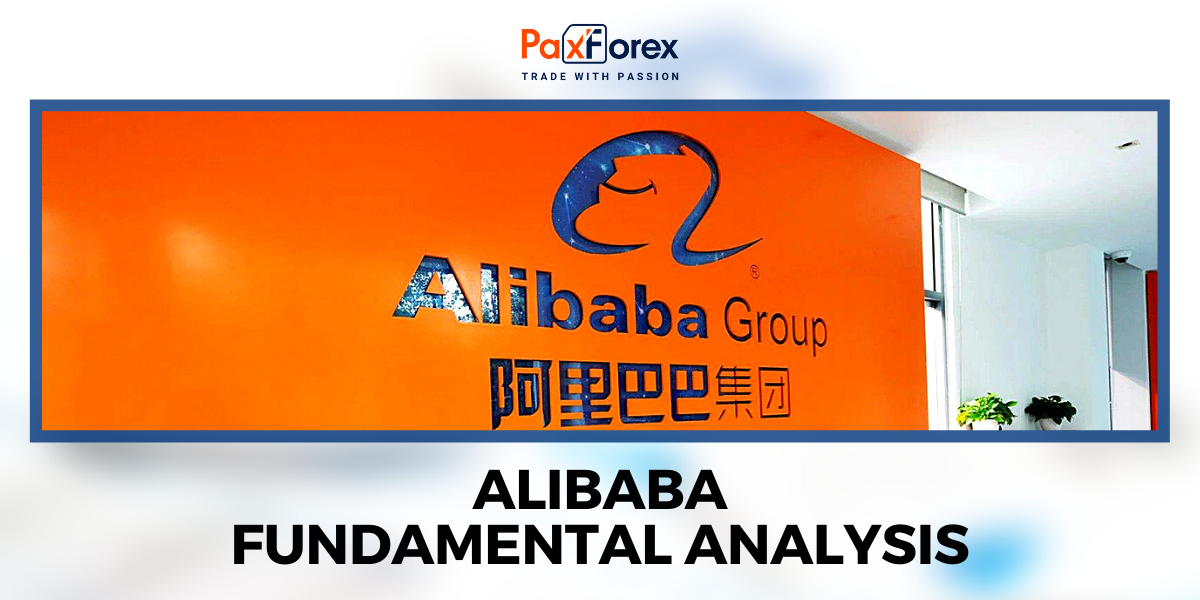
Source: PaxForex Premium Analytics Portal, Fundamental Insight
Competition in the cloud computing arena is intensifying as Alibaba Group, a prominent Chinese tech company, introduces a new artificial intelligence (AI) update, seemingly to challenge the dominant cloud leaders, Amazon and Microsoft.
However, despite these efforts, Alibaba's stock performance has remained lackluster, trading only slightly above its initial public offering (IPO) price from nine years ago. Additionally, mounting political risks associated with the company have dissuaded some investors from considering it as an attractive investment. Here's why their caution is justified for the time being.
Alibaba Cloud is undoubtedly a significant player in the cloud industry, ranking as the fourth-largest cloud provider in terms of market share. Furthermore, their enhanced AI model leverages improved generative AI capabilities, enabling it to comprehend complex instructions and handle tasks like copywriting, reasoning, and memorization, as per an official Alibaba press release.
Earlier this year, Alibaba announced its plan to split into six distinct business units, with Alibaba Cloud set to become a separate entity. However, former CEO Daniel Zhang's recent actions have introduced uncertainty. He stepped down as CEO in June to concentrate on the cloud division, only to resign as the head of the cloud unit in September.
These leadership changes naturally raise questions about the future direction of this specific segment of Alibaba's business. Nevertheless, Alibaba continues its expansion efforts despite these uncertainties. In the second quarter of 2023 alone, it generated 234 billion yuan ($32 billion) in revenue, marking a 14% year-over-year increase. Regrettably, even with the improved generative AI capabilities, Alibaba Cloud did not make a significant contribution to this growth, reporting only 25 billion yuan ($3.5 billion) in revenue, a modest 4% increase over the same period.
Fortune Business Insights has projected a 20% Compound Annual Growth Rate (CAGR) for the cloud industry until 2030, suggesting that the current slowdown is likely temporary. Nevertheless, this growth rate underscores that Alibaba, like its counterparts such as Amazon, is not immune to the prevailing challenges affecting the cloud sector.
Alibaba's net income surged to 33 billion yuan ($4.6 billion), marking a substantial 63% increase compared to the previous year. The company achieved this by keeping its operating expenses in check, resulting in rapid profit growth. Despite this impressive performance, Alibaba's earnings multiple is considerably lower than that of its industry peers.
It's worth noting that investors are not acquiring Alibaba stock directly but rather American depositary shares (ADS), which represent Alibaba shares held by banks. While this arrangement isn't inherently risky, concerns over deteriorating US-China relations could cast doubt on the future of ADS.
Furthermore, even without geopolitical concerns, Alibaba's division into six distinct units raises questions about the company's trajectory beyond the resignation of Daniel Zhang. Each of these units is set to raise capital independently and potentially launch initial public offerings (IPOs), introducing further uncertainties during the filing process.
This, in part, explains why Alibaba's stock has been trading within a certain range since the announcement. Despite the potential value unlocked by the company's division, investors may remain cautious due to the multitude of uncertainties surrounding its future and broader macroeconomic risks.
Understandably, investors have shown increased interest in AI stocks, particularly in the context of generative AI. Alibaba's aspirations to compete with Amazon and Microsoft in this domain could position the company favorably in terms of competition. However, amidst the current cloud industry slump, Alibaba faces various uncertainties. Additionally, deteriorating US-China relations could render the stock an unattractive investment, even if there are opportunities related to the planned breakup.
While investors are always on the lookout for bargains, especially in the realm of generative AI, the uncertainties surrounding Alibaba suggest that caution is advisable when considering this specific AI stock at present.
.
While the price is above 84.00, follow the recommendations below:
- Time frame: D1
- Recommendation: long position
- Entry point: 85.14
- Take Profit 1: 86.45
- Take Profit 2: 88.50
Alternative scenario:
If the level 84.00 is broken-down, follow the recommendations below:
- Time frame: D1
- Recommendation: short position
- Entry point: 84.00
- Take Profit 1: 83.00
- Take Profit 2: 82.00













